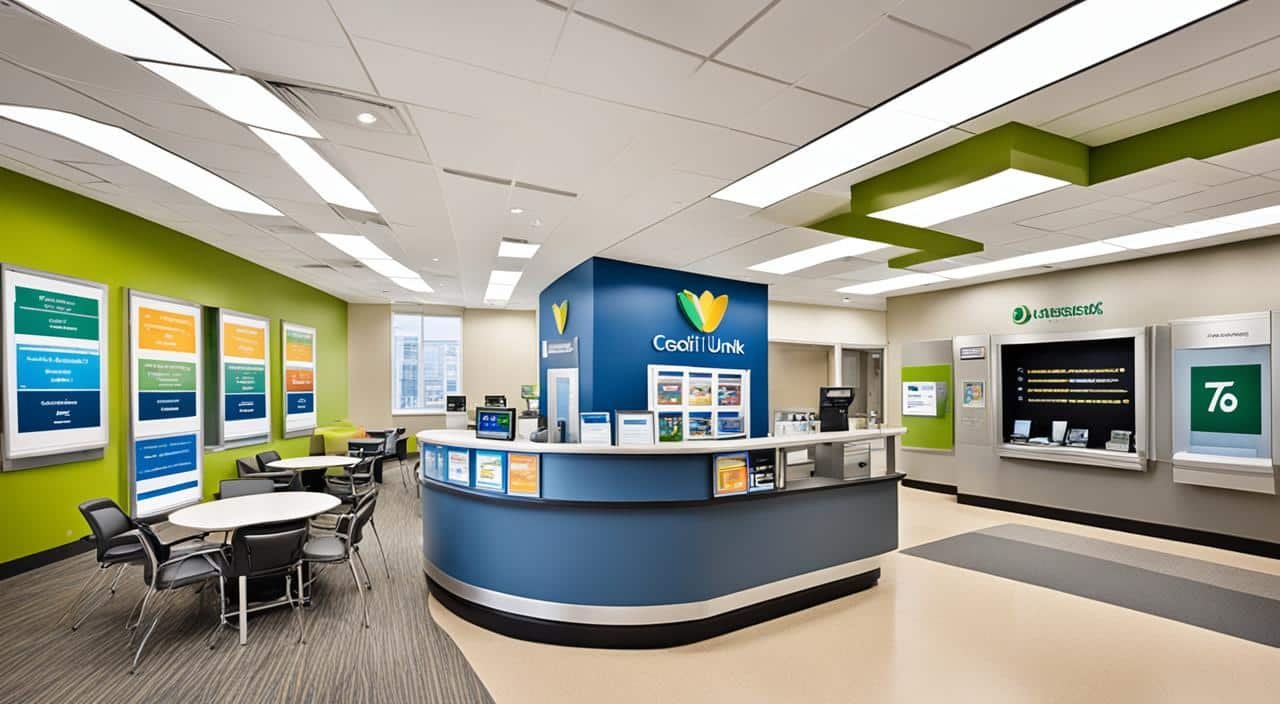What Is A Credit Union And How Does It Work?
Credit unions are not-for-profit financial groups. They offer services like savings and checking accounts, loans, and credit cards. Unlike banks, they aim to help their members, not make profits for shareholders. This means they can give personalized financial help and support local communities.
These financial groups have a long history, starting in the 19th century in Europe. They were created to help people who couldn’t get banking services before. By the early 20th century, they reached the United States, and now there are thousands of credit unions serving millions of people.
What sets credit unions apart from banks is how you join. You usually need to be connected to the credit union in some way, like living nearby, working for a certain company, or being part of a group. This approach helps credit unions focus on their members’ specific needs.
Key Takeaways
- Credit unions are not-for-profit financial institutions owned and controlled by their members.
- Credit unions focus on providing personalized financial solutions and supporting their local communities.
- Credit unions have a long history, dating back to the 19th century in Europe and the early 20th century in the United States.
- Membership requirements for credit unions are typically based on a specific connection to the organization, such as location, employer, or community group.
- The membership structure of credit unions helps them maintain a strong sense of community and tailor their services to the unique needs of their members.
Understanding Credit Unions
Credit unions are not-for-profit financial groups owned by their members. They are different from banks, which aim to make profits for shareholders. Credit unions focus on helping their community with financial services and products.
Defining a Credit Union
Credit unions are all about working together. Members share resources to get affordable financial services. Everyone has a say in what the credit union does, making sure it meets the community’s needs.
History and Origins
The idea of credit unions started in the 19th century in Europe. The first one was set up in 1901 in Germany. Now, credit unions help people worldwide, offering an alternative to traditional banks. They help people reach their financial goals and feel more financially confident.
| Key Characteristics of Credit Unions | Explanation |
|---|---|
| Nonprofit, Cooperative Structure | Credit unions are not-for-profit organizations owned and controlled by their members, unlike traditional banks that are focused on generating profits for shareholders. |
| Community-Focused | Credit unions are designed to serve the specific financial needs of their local community, rather than a broad, national customer base. |
| Member-Owned and Controlled | Each credit union member has an equal say in the institution’s operations and decision-making, regardless of the size of their account or deposit. |
“Credit unions are not-for-profit financial cooperatives that exist to serve their members, not to generate profits for outside investors.”
Membership Requirements

Joining a credit union is different from going to a traditional bank. Credit unions have membership requirements that you must meet to join. These can change based on the credit union, but they usually fall into a few main types.
One way to join a credit union is by living in a certain area. Many credit unions focus on people who live, work, worship, or go to school in a specific place. You need to live in this area to become a member.
Another way to qualify is through your job or group membership. Some credit unions are for employees of a certain company or industry. Others are for people in a specific community, profession, or faith group. You must have a link to the group the credit union helps.
Some credit unions also look at your income or credit history. These rules help make sure the credit union’s services are for its main membership group.
Even with these membership rules, joining a credit union is easy. If you’re eligible, you can enroll in online banking or visit a branch to apply and open your account.
| Membership Requirement | Description |
|---|---|
| Geographic Location | Residing within the credit union’s designated service area, such as a city, county, or state. |
| Employment or Association | Being employed by or affiliated with a specific organization, industry, or community group. |
| Income Level or Credit History | Meeting certain financial criteria set by the credit union to ensure accessibility to its services. |
Credit Union vs. Bank: Key Differences
Credit unions and banks have key differences that are important to know. The main differences are in how they are owned and what they aim to make.
Ownership Structure
Credit unions are run by their members. This means customers own the credit union and have an equal say in how it’s run. Banks, however, are owned by shareholders who might not even use the bank’s services.
Profit Motives
Credit unions aim to help their members by offering affordable financial services. They are nonprofit organizations. Any extra money they make goes back to the members in the form of lower fees or better savings rates. Banks, though, focus on making a profit. They balance what customers want with what shareholders expect.
These differences affect the services, fees, and how customers feel about credit unions and banks. Knowing these differences helps people choose the right financial partner.
“Credit unions are focused on serving their members, not maximizing shareholder returns.”
Services Offered by Credit Unions

Credit unions are not-for-profit financial institutions. They offer many services to their members. These services include savings and checking accounts, loans, and credit cards. They aim to provide competitive rates and personalized attention to help manage finances well.
Savings Accounts
Credit unions have high-yield savings accounts with good annual percentage yields (APYs). These accounts are safe and easy to use. They are great for people and families wanting to build their financial security.
Checking Accounts
Credit unions also offer checking accounts for everyday financial needs. These accounts often have no monthly fees, free debit cards, and rewards programs. They help members manage their day-to-day transactions and cash flow better.
Loans and Credit Cards
| Loan Type | Credit Union Offerings |
|---|---|
| Personal Loans | Credit unions offer personal loans with competitive interest rates and flexible repayment terms. They are a good choice for members needing financing for various personal needs. |
| Auto Loans | For auto financing, credit unions have lower interest rates and more favorable terms than banks and dealerships. This helps members save money on their vehicle purchases. |
| Home Loans | Credit unions have a variety of home loan products, like mortgages and home equity loans/lines of credit. They often have competitive rates and personalized service. This helps members reach their homeownership goals. |
| Credit Cards | Credit unions offer credit card options with low interest rates, no annual fees, and rewarding programs. These cards provide convenient financing and help members build their credit history. |
Credit unions aim to meet the unique needs of their members with a wide range of financial services. They provide the tools and resources needed to manage finances effectively and achieve financial goals.
Advantages of Joining a Credit Union
Thinking about your financial options? Joining a credit union can be a smart move. These places focus on their members, offering personalized services and great rates. This can help you reach your financial goals.
Lower Fees and Better Rates
Being a member of a credit union means you might pay less in fees and get better rates on things like savings accounts and loans. Credit unions aim to serve their members, not just make money. So, they often have cheaper options than banks.
Community Focus
Credit unions also care a lot about the communities they’re in. They like to give back through local projects and help out in many ways. By joining, you’re part of a group that works to build trust and financial confidence in the community.
“Credit unions are a true reflection of the communities they serve, offering a level of personalized service and support that can be hard to find elsewhere.”
Looking to grow your savings, get a good loan, or find a financial partner you can trust? A credit union could be perfect for you. They’re great for meeting your financial needs and giving you peace of mind.
Credit Union Governance
Credit unions are special financial places that don’t aim to make profits. They are owned by their members and run on a not-for-profit basis. Unlike banks, which focus on making money, credit unions are led by their members in a democratic way. This means members have a say in how their financial institution is run.
The board of directors is at the core of credit union governance. This group is made up of volunteers elected by the members. They make sure the credit union follows its mission and serves its members well. The board oversees the credit union, sets policies, and keeps the organization focused on its goals.
Credit unions stand out because of their democratic way of making decisions. Members can vote in board elections or share their thoughts at meetings. This level of involvement is unique to credit unions and sets them apart from traditional banks.
The way credit unions are governed shows their commitment to being member-owned and cooperative. By letting members influence the credit union’s direction, it stays true to its purpose. This approach makes sure the credit union answers to the people it was made to help.
| Key Aspects of Credit Union Governance | Description |
|---|---|
| Nonprofit, Member-Owned Model | Credit unions are not-for-profit organizations, owned and controlled by their members. |
| Democratic Control | Members have a direct voice in the governance of their credit union through the election of a volunteer board of directors. |
| Oversight and Accountability | The board of directors is responsible for overseeing the credit union’s operations and ensuring it remains true to its mission of serving members. |
| Community Focus | Credit unions are deeply rooted in the communities they serve, with a focus on meeting the financial needs of their members. |
Understanding how credit unions are governed helps us see why they’re different from banks. Their cooperative model lets members really have a say in what happens. This makes credit unions trusted and responsive partners in people’s financial lives.
Choosing the Right Credit Union
Choosing the right credit union can greatly impact your finances. They offer services like savings and checking accounts, loans, and credit cards. To pick the best one, it’s key to look into your options and see what they offer.
Researching Options
First, check out credit unions near you. They often have rules for joining, like living in a certain area or working for a specific company. Make sure you meet these requirements. Also, think about how easy it is to access their services, like branches and online banking, to match your needs.
Evaluating Services and Fees
- Look at the interest rates and fees for different accounts at the credit unions you’re looking at. Choose ones with good rates and low fees to save money over time.
- See what rewards and benefits each credit union offers. These can give you extra perks for your banking.
- Think about how easy it is to get help from the credit union’s staff. Good customer service can make a big difference in your banking experience.
| Credit Union A | Credit Union B | Credit Union C |
|---|---|---|
| Checking Account Fees: $5/month | Checking Account Fees: $0/month | Checking Account Fees: $3/month |
| Savings Account Interest Rate: 0.50% APY | Savings Account Interest Rate: 0.75% APY | Savings Account Interest Rate: 0.60% APY |
| Auto Loan Rates: 4.99% APR | Auto Loan Rates: 3.99% APR | Auto Loan Rates: 4.75% APR |
By doing your homework and comparing what different credit unions offer, you can pick the one that fits your financial needs and financial goals best.
Opening a Credit Union Account

Joining a credit union and opening an account is easy but needs some important documents. Credit unions are owned by their members. They have rules to join and open an account.
Required Documentation
You’ll need to provide certain documents to open a credit union account:
- Proof of identity, like a valid driver’s license, passport, or state-issued ID card
- Proof of eligibility for credit union membership, which may include evidence of employment, residence, or community affiliation
- Personal information, including your full name, address, date of birth, and Social Security number
- Initial deposit, which is often a minimum amount required to open the account
You’ll also need to fill out a membership application. This might ask about your financial background and goals.
| Required Documentation | Purpose |
|---|---|
| Proof of Identity | Verifies your identity and eligibility for credit union membership |
| Proof of Eligibility | Demonstrates your connection to the credit union’s field of membership |
| Personal Information | Allows the credit union to open your account and communicate with you |
| Initial Deposit | Establishes the minimum balance to open and maintain the account |
With the needed documents and application, you can join a credit union. You’ll get access to many financial services and benefits.
Also Read: What Are Credit Card Rewards And How Do They Work?
Managing Your Credit Union Accounts
Being a credit union member means you need to keep an eye on your finances. Start by checking your savings and checking accounts often. Make sure they match your budget. Pay your loans and credit cards on time using your credit union’s online and mobile banking.
It’s important to look over your account statements. This helps you keep track of your spending and spot any mistakes. Credit unions make it easy to see where your money goes. Use their tools and resources to plan your budget, save, and reach your financial goals. Your credit union is there to help you on your financial journey, so ask for advice when you need it.
With good account management, you can get the most out of being a credit union member. Stay active, informed, and take charge of your accounts. This will help you meet your financial goals.
FAQs
Q: What is a credit union and how does it work?
A: A credit union is a member-owned financial institution that provides a range of financial services, including savings accounts, loans, and mortgages. Members pool their resources to provide loans and other services to each other, often at lower rates than traditional banks.
Q: How can I open an account at a credit union?
A: To open an account, you typically need to become a member of the credit union. This may involve meeting certain eligibility criteria based on factors like your location, employment, or membership in a partner organization. You can usually start the process online or visit a local branch.
Q: What types of loans do credit unions offer?
A: Credit unions offer several types of loans, including auto loans, personal loans, mortgages, and home equity loans. They may also provide business accounts and loans, although this often excludes business-specific services.
Q: Are there any fees associated with credit union accounts?
A: Many credit unions offer free checking accounts without monthly maintenance fees. However, some accounts may have minimum balance requirements or fees for services like early withdrawal from share certificates. Always check the specific terms and fees before opening an account.
Q: How do credit unions compare to traditional banks in terms of earnings?
A: Credit unions often provide higher earnings on savings accounts and lower interest rates on loans compared to traditional banks. This is because they are not-for-profit institutions that focus on serving their members rather than maximizing profits.
Q: Can I refinance my loans with a credit union?
A: Yes, credit unions frequently offer refinancing options for existing loans, including mortgages and auto loans. They may provide competitive rates and terms, helping you save money on interest payments.
Q: What is digital banking, and do credit unions offer it?
A: Digital banking refers to conducting financial transactions online or through mobile apps. Most credit unions offer robust digital banking services, allowing members to manage their accounts, transfer funds, and pay bills from anywhere.
Q: Are credit unions safe and secure?
A: Yes, credit unions are generally safe and secure. They are insured by the National Credit Union Administration (NCUA), which protects your deposits up to $250,000 per account holder, similar to FDIC insurance for banks.
Q: What rewards programs do credit unions offer?
A: Many credit unions provide rewards programs that offer cash back, higher interest rates on savings, or special bonuses for using certain products or services. These programs are designed to help members grow their money and enhance financial confidence.
Q: How can credit unions help me make informed financial decisions?
A: Credit unions often provide guidance and resources, including articles and educational tools, to help members understand their financial options. They aim to empower members to make informed decisions about their money, whether it’s for loans, investments, or savings.
